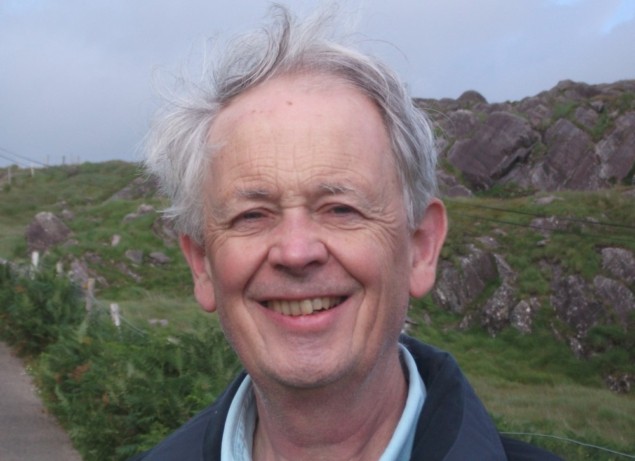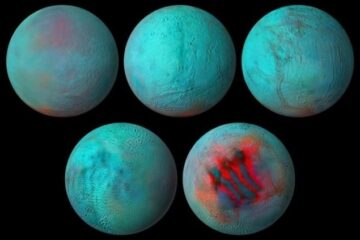
The astrophysicist James Binney from the University of Oxford has won the 2023 Isaac Newton Medal and Prize “for advancing the science of stellar dynamics and using strong physical intuition to widen and deepen our understanding of how galaxies are structured and formed”. Presented by the Institute of Physics (IOP), which publishes Physics World, the international award is given annually for “world-leading contributions to physics”.
Binney was born in 1950 in Surrey, UK. Binney completed the mathematical tripos at the University of Cambridge in 1971 and then moved to Oxford to do a DPhil under the supervision of Dennis Sciama, graduating in 1975. After stints at the Institute for Advanced Study in Princeton, in 1981 he returned to Oxford where he remained for the remainder of his career.
Binney’s research has focused on the structure, dynamics and formation of galaxies, introducing new ways of building models of galaxies and understanding the orbits of stars within them.
His work has also led to an understanding of the role that black holes play in limiting star formation as well as the role that a galaxy’s structure plays in its chemical evolution.
As well as the 2023 Newton Medal and Prize, other honours include the IOP’s Dirac Medal in 2010, the Royal Astronomical Society’s Eddington Medal in 2013 and in 2022 Binney became an international member of the US National Academy of Sciences.
He also published several books including Galactic Dynamics in 1988, which he co-wrote with Scott Tremaine as well as Galactic Astronomy in 1998, which he published with Michael Merrifield.
Binney told Physics World that he owes “almost everything to the wonderful students, postdocs and colleagues” that he has worked with and feels “hugely honoured” to receive the Newton Medal and Prize.
“Embarrassed too because Newton was such a towering intellect and I’m such a humble foot soldier,” he adds. “In Newton’s time quite a small number of extraordinary people discovered the scientific method and ever since foot soldiers like me have been pushing the boundaries of knowledge at an ever-increasing pace.”
Binney also pays tribute to the people that have contributed to building huge telescopes that have allowed us to delve deeper into the cosmos. “Engineers have given us tools of previously unimaginable power, and intellectually astronomy has migrated to the core of physics from an outlying position that was neither physics nor mathematics,” he adds. “I’m proud to feel I’ve played a small role in those developments.”
Inspiring the next generation
Binney’s honour formed part of the IOP’s wider 2023 awards, which recognize everyone from early-career scientists and teachers to technicians and subject specialists.
Other winners include Belinda Wilkes, who receives the Richard Glazebrook Medal and Prize for her work on quasars and directing the Chandra X-ray Center, which supports the operation of NASA’s X-ray observatory.
The School’s Observatory, meanwhile, receives the William Thomson, Lord Kelvin Medal and Prize for its work making astronomy more accessible.

Laser pioneer Margaret Murnane bags 2022 Isaac Newton Medal and Prize
In a statement, IOP president Keith Burnett congratulated all the winners. “Each and every one of them has made a significant and positive impact in their profession, whether as a researcher, teacher, industrialist, technician or apprentice,” notes Burnett. “There is so much focus today on the opportunities generated by a career in physics and the potential our science has to transform our society and economy and I hope the stories of our winners will help to inspire future generations of scientists.”
The full list of 2023 award winners is available here.
- SEO Powered Content & PR Distribution. Get Amplified Today.
- PlatoData.Network Vertical Generative Ai. Empower Yourself. Access Here.
- PlatoAiStream. Web3 Intelligence. Knowledge Amplified. Access Here.
- PlatoESG. Carbon, CleanTech, Energy, Environment, Solar, Waste Management. Access Here.
- PlatoHealth. Biotech and Clinical Trials Intelligence. Access Here.
- Source: https://physicsworld.com/a/astrophysicist-james-binney-bags-2023-isaac-newton-medal-and-prize/
- :has
- :is
- :where
- 1998
- 2013
- 2022
- 2023
- a
- AC
- Academy
- accessible
- Adds
- advanced
- advancing
- After
- All
- allowed
- also
- an
- and
- Annually
- ARE
- AS
- astronomy
- At
- award
- bags
- became
- because
- been
- Black
- black holes
- Books
- born
- boundaries
- Building
- building models
- by
- cambridge
- Career
- Center
- chemical
- Completed
- contributed
- contributions
- Core
- Cosmos
- Deepen
- deeper
- delve
- developments
- directing
- discovered
- do
- dynamics
- economy
- EVER
- ever-increasing
- Every
- everyone
- everything
- evolution
- extraordinary
- feel
- Focus
- focused
- Foot
- For
- formation
- formed
- from
- full
- future
- Galaxies
- generated
- generations
- given
- Have
- he
- help
- her
- his
- Holes
- hope
- How
- HTTPS
- huge
- humble
- i
- image
- Impact
- in
- include
- information
- inspire
- Institute
- International
- into
- introducing
- issue
- ITS
- james
- jpg
- keith
- Kelvin
- knowledge
- Led
- like
- limiting
- List
- made
- Making
- mathematical
- mathematics
- max-width
- me
- Meanwhile
- member
- method
- Michael
- migrated
- models
- more
- moved
- much
- National
- Neither
- New
- Newton
- next
- Notes
- number
- observatory
- of
- on
- ONE
- operation
- opportunities
- or
- Other
- our
- Oxford
- Pace
- part
- pays
- People
- physical
- Physics
- Physics World
- pioneer
- plato
- Plato Data Intelligence
- PlatoData
- Play
- played
- plays
- position
- positive
- postdocs
- potential
- power
- presented
- previously
- Princeton
- prize
- profession
- proud
- published
- Pushing
- quite
- receive
- receives
- recognize
- remainder
- remained
- research
- researcher
- Richard
- Role
- royal
- Science
- SCIENCES
- scientific
- scientists
- scott
- several
- significant
- since
- small
- So
- Society
- specialists
- Star
- Star formation
- Stars
- Statement
- Stellar
- Stories
- strong
- structure
- structured
- Students
- Study
- subject
- such
- supervision
- Supports
- Surrey
- teachers
- telescopes
- that
- The
- their
- Them
- then
- those
- thumbnail
- time
- to
- today
- told
- too
- tools
- Transform
- tribute
- true
- Uk
- under
- understanding
- unimaginable
- university
- university of cambridge
- University of Oxford
- us
- using
- was
- ways
- WELL
- whether
- which
- WHO
- widen
- will
- william
- winners
- with
- within
- Won
- wonderful
- Work
- worked
- world
- x-ray
- zephyrnet













